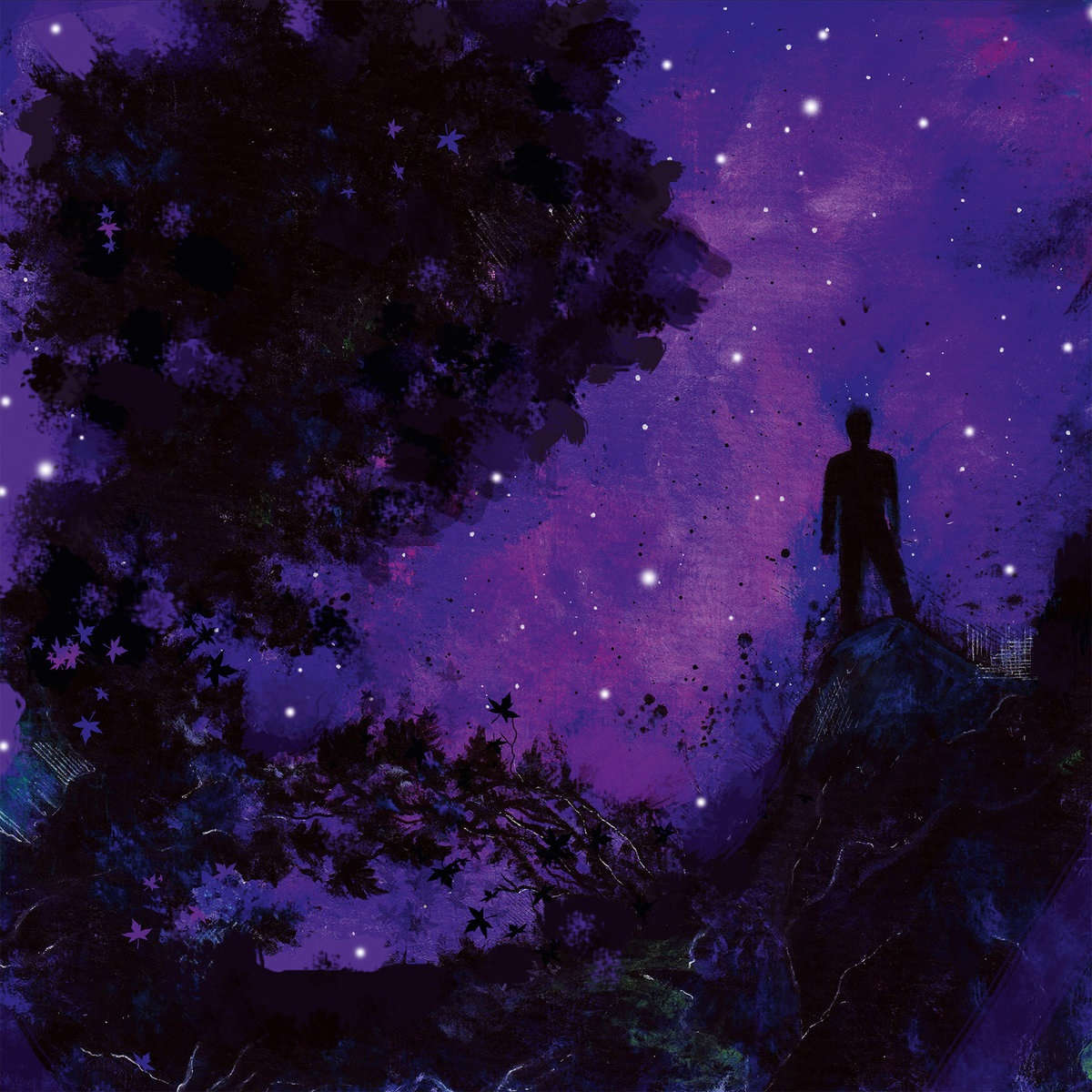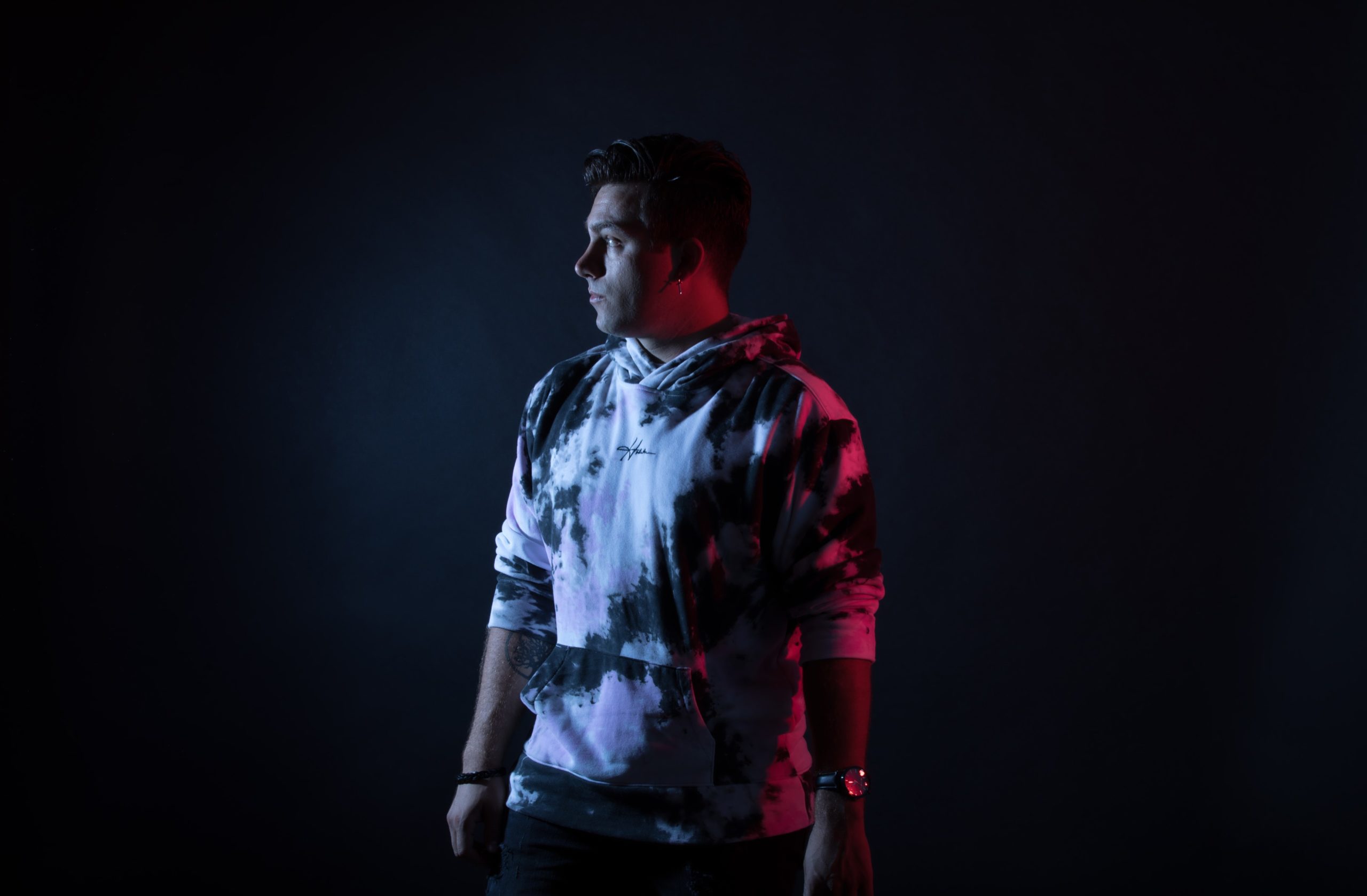Interviews
Canadian Post-Black Metal Newcomer UNREQVITED Speaks to the Virtue of Going it Alone
Ottawa’s one-man hyper-melodic post-black metalgaze project Unreqvited is fueled by the brilliance of the man who goes only by the title 鬼. We spoke with him about the origins of his symbolic name, how he goes about conducting his career, and his new Prophecy Productions album Mosaic II: La Déteste et la Détresse.

The technological advances and options offered to humankind these days are a double-edged sword. You’ve probably had your face buried in the glow of your phone for most of today, but all the information consumed comes at the expense of your attention span and the greater risk of broken noses from walking smack, dab into walls. Automation is great for productivity, but it’s killing the flesh-blood-and-bone labour force. Additionally, hasn’t anyone making all these supposedly necessary tech advances ever watched The Terminator? And the day Silicon Valley can keep my laptop from crashing or my iPhone from mysteriously shutting down and needing a hard restart is the day I’ll consider stepping into a self-driving car.
On the other hand, if weren’t for music software and home recording rigs, the lilting sounds of Ottawa’s one-man hyper-melodic post-black metalgaze project, Unreqvited might have never left the head of its creator, 鬼. After deciding to go the solo route in the fall of 2016, Unreqvited has quickly amassed a discography consisting of four full-lengths, two EPs and two split EP appearances. The next and most recent step has been the inking of a deal with Prophecy Productions which simultaneously releasing latest long-player, Mosaic II: La Déteste et la Détresse, its companion piece/immediate predecessor Mosaic I: L’amour et L’ardour, as well as a split with Sylvaine on January 10th.
Additionally, those wishing to purchase the CD version of Mosaic I & II will have the option of obtaining it packaged with a hardbound, 60-page book. And it’s not just the music that our man tends to all by his lonesome: he single-handedly manages all merchandise designs and orders as well as the band’s social media presence. Just typing all that makes me want to take a nap, let alone actually, you know, doing it. We caught up with 鬼 via email during some rare downtime to ask about solitude, deliberate emotional expression and the unquenchable need to create.
Off of Mosaic II: La Déteste et la Détresse, check out the music video for “Nightfall:”
Can you give a brief history of Unreqvited? Maybe not so much a history, but what was the “a-ha” moment where you decided that doing a solo project was the direction you wanted to go in?
鬼: “I actually began this project while I was still touring in a band. I enjoyed touring and collaborating with other people, but I felt this strong urge to start working on something that would be entirely my own. I’m not sure there was an ’a-ha’ moment, but I remember while I was on tour with my previous band I was writing a lot of material that wouldn’t necessarily fit our metalcore/nü-metal sound. I started compiling some of it and eventually put together what would become Unreqvited’s debut record, Disquiet.”
Also, can you tell us about the use of a symbol as your pseudonym? What are the origins of this, what does it mean/represent and why use that as opposed to anything else (including your actual name)?
鬼: “It is the kanji character for ’ghost.’ I’ve always liked anonymity and mystery in dark music and I wanted to come up with a moniker that had an ethereal vibe to match the music that I make. I went with kanji simply because I’ve always been very interested in Japanese culture.”
How solo is Unreqvited? Are all instruments written and performed by your lonesome with no help from any session players?
鬼: “Yes, that is correct. I do everything myself. However, I do not perform all of the instruments. Most of them are software instruments. I write and arrange it all, though.”
Mosaic II: La Déteste et la Détresse was released January 10th, 2020, via Prophecy Productions:

I’m going to assume you’ve played in bands previous to Unreqvited. How would you characterize the machinations of life in a band with a fully fleshed out lineup versus going it alone? What the pros and cons?
鬼: “The biggest pro is most definitely creative control. Collaborating with a group of people can be fun, but most of the time everyone has to come to some sort of compromise for everyone to be happy. The biggest con of doing it myself would likely be the workload. Writing and producing everything myself can burn me out quickly if I don’t take breaks. If I ever brought this project into a live setting I think it would remain a solo project at its core and I’d just hire live members.”
How about recording? Do you handle that process yourself entirely or work with an engineer/producer and someone for mixing and mastering?
鬼: “I do it entirely myself. I’d love to do a big budget Unreqvited record with a producer someday, but I just really can’t afford it right now.”
Your BandCamp description lists Unreqvited as “depressive and uplifting,” which sounds counterintuitive, if not contradictory. On that note, are complementing polar opposites and dichotomy a theme that runs throughout Unreqvited?
鬼: “Absolutely, the duality between depressive and uplifting melodies is the main sonic element that I wanted to cement into this project from its inception. There’s something unsettling yet alluring about a happy sounding melody with tortured screams layered on top of it.”
Listen to more from Unreqvited’s EP with Sylvaine: Time without End, “Meadows of Elysium”:
Various journalistic portals refer to Unreqvited as black metal, or post-black metal. Sure, there’s some of that, but not enough to warrant a definitive label one way or another. At what point did the broadstroke of possibility take over and usurp the idea of being beholden to a specific scene or set of influences?
鬼: “I’m not for or against being categorized into these genres. I use them myself when describing my music online. None of my creative exploits are ever meant to fit into any arbitrary genre boundaries, though; I’m ultimately just putting the music in my head onto paper. I think one of the greatest things about ’post-black metal’ is the reapplication of the same ethos that founded black metal in the first place: a reaction to the complacency of metal. Newer bands are pushing the boundaries of what this genre can sound and look like, and I think that’s really cool.”
Similarly, despite the anonymity and mystery cloaking Unreqvited, there’s a communal nature to your project in which you engage with fans on social media and self-promote pretty handily which is in direct opposition to black metal’s isolationist nature. Is this out of necessity, an extension of your personality, or what?
鬼: “The latter, for sure. I’m a quiet, anxious person, but I’d like to consider myself to be pretty kind. I want to engage with people and help anyone I can, so creating and fostering a community of like-minded people is extremely important to me. I’ve had long, in depth talks with fans via direct message where they’ve gone in depth about the daily struggles they’re facing. Sometimes I’ll open up to them too if I feel it might help them in some way. If I’m going to promote any sort of message with my platform, I want it to be a hopeful one.”
Check out all of Mosaic I: l’amour et l’ardeur here:
Your discography has been built over a comparatively short period of time. What do you attribute your prodigious creative spell to?
鬼: “Writing music is one of the only things that I ever feel compelled to do. I need to create or I’ll likely lose my mind. I don’t have any other outlets, and I’m not a talkative person. I’m far better at communicating via a piece of music than words. I’m positive I’ll be doing this for the rest of my life. I honestly can’t imagine myself doing anything else.”
Were Mosaic I and Mosaic II written at the same or different times? What in your mind and ears accounts for the album having two distinct parts and releases? How do you characterize the releases against one another and how long was the writing process?
鬼: “These two albums were written together over the course of 2018 as somewhat of a therapy experiment for myself. All of the joy, love, euphoria, etc. (that) I felt over this time period went into Mosaic I, and all of the anger, sadness, anxiety, etc. (that) I felt went into Mosaic II. I would only work on these albums depending on how I was feeling. This resulted in them completely opposing each other in sound. Because this record was written when I was at some of my lowest points, it became rather difficult to finish. I had to force myself to work on it during times when I was feeling too depressed to even get out of bed. I don’t know exactly how long it took to finish, but it was completed around September 2018 and I think I started working on both of them together around February 2018.”
Was there anything that was done differently in terms of the way the album was written or recorded that what you had done in the past?
鬼: “Working on this record felt like a bit of a blur, so I don’t actually remember a lot of the writing process. I just remember the cathartic feeling that I always felt after I would force myself to work on it despite overwhelming feelings of despondency. It was ultimately a very successful therapy experiment, but I don’t think I’ll do something like this again. It did make for two very unique albums that I’m very happy with, but I like being able to create whatever kind of music I want, whenever I want.”
Released in 2016, listen to “An Ocean of Ire” off of Disquiet:
What is the significance or story behind the album’s title? What does the album’s subtitle, La Déteste et la Détresse mean or refer to?
鬼: “A mosaic is an image that is put together with many tiny pieces and these two records are essentially composed of tiny pieces of the person I was over the course of the year it was written. One of my favorite parts about being an artist is getting to immortalize all of the things I experience over a certain time period in the form of an album. It’s always interesting to go back and open up those time capsules. The subtitles I chose for these two records are pretty literal. L’amour et L’ardeur (love and ardor) and La Déteste et la Détresse (hate and distress). These are quite simply the main emotions and feelings that went into the writing of these records.”
What comprises the 60-page book that accompanies the limited physical release of the album and how does it pair with the music?
鬼: “This was a very ambitious idea, but I wanted to gather stories from fans about things they had gone through in their lives and compile them into a Mosaic I & II book with some photography. Because Mosaic I was written with positive emotions and Mosaic II was written with negative emotions, I wanted to get two stories from each contributor: their most memorable uplifting/heartwarming experience and their most painful/traumatic experience. The final product turned into a massive array of different formats, some are letters, some are poems, short stories, etc. The fans seemed to really enjoy being able to contribute to an Unreqvited product and I very much enjoyed being able to give them the platform to share their stories. Some of these contributors are even coming out for the first time about their experience and it means the world to me that I’m able to give these people a voice to speak about things they haven’t had the courage to before.”
I’m going to assume that playing live as Unreqvited isn’t something that’s up for much consideration, but why do you choose to remain as a studio/recording project?
鬼: “I’ve done lots of touring in the past and the main thing is that it’s very expensive. Unless you’re a well established band, you’re paying out of pocket to tour. I’m not ruling it out completely as an option for the future, but not any time soon. For now, it’s much easier for me to work alone and write/record everything by myself in my bedroom. Maybe if Unreqvited really starts getting some traction I’ll consider it.”
Check out the entirey of Mosaic II: La Déteste Et La Détresse here:
How and when did Prophecy come into the picture? Were there any reservations upon being approached and signing to a bigger label than what you’d been used to working with previously?
鬼: “I actually reached out to Prophecy as soon as the album was done, back in October of 2018. It took a really long time to get everything together, three releases coming out at once isn’t exactly easy to plan, but we’re all very happy with the result! My only real reservation with signing to a bigger label is signing away the rights to my music. Normally, I like to do licensing deals with labels, where they license out the rights to the album for a certain period of time, usually 36 months, and get to print their own copies of the CD/vinyl and send me a percentage of them. This is a trial run for me to see if the benefits of sacrificing your intellectual property to work with a bigger label outweigh the drawbacks.”
Does Prophecy have bigger plans for you on the table once the album is out? Is there going to be a wider promotion campaign and more responsibility falling in your lap?
鬼: “They pretty much let me do whatever I want, which is nice. There’s no obligation to go out on tour or anything like that. Prophecy does have the biggest reach out of any of the labels I’ve worked with in the past, so the promotion campaign will definitely reflect that. I’m not sure if I’ll have more responsibilities to take on, but I welcome them!”
What’s next for you under the banner of Unreqvited?
鬼: “Well, the next album is pretty close to being complete. That’ll probably be coming out roughly halfway through the year. I have a short split EP that’ll be coming out in the spring. I’m working on some new merch items and some new physical formats of previous albums/EPs that I haven’t done yet and probably quite a few other things as well that I’m not thinking of right now. Outside of the Unreqvited banner, I’m working on two records for my side project The Ember, The Ash that will both be coming out in 2020 as well.”
Thanks for doing this and your time.
鬼: “Thank you very much for the interview. I always appreciate having a platform to talk about the things I spend all my time slaving away at.”
-

 Alternative/Rock7 hours ago
Alternative/Rock7 hours agoThe V13 Fix #010 w/ High on Fire, NOFX, My Dying Bride and more
-

 Hardcore/Punk7 days ago
Hardcore/Punk7 days agoHastings Beat Punks Kid Kapichi Vent Their Frustrations at Leeds Beckett University [Photos]
-

 Alternative/Rock6 days ago
Alternative/Rock6 days agoA Rejuvenated Dream State are ‘Still Dreaming’ as They Bounce Into Manchester YES [Photos]
-

 Culture1 week ago
Culture1 week agoCirque Du Soleil OVO Takes Leeds Fans on a Unique, Unforgettable Journey [Photos]
-

 Music1 day ago
Music1 day agoReclusive Producer Stumbleine Premieres Beat-Driven New Single “Cinderhaze”
-

 Indie1 week ago
Indie1 week agoMichele Ducci Premieres Bouncy New Single “You Lay the Path by Walking on it”
-

 Culture2 days ago
Culture2 days agoDan Carter & George Miller Chat Foodinati Live, Heavy Metal Charities and Pre-Gig Meals
-

 Alternative/Rock1 week ago
Alternative/Rock1 week agoWilliam Edward Thompson Premieres His Stripped-Down “Sleep Test” Music Video












